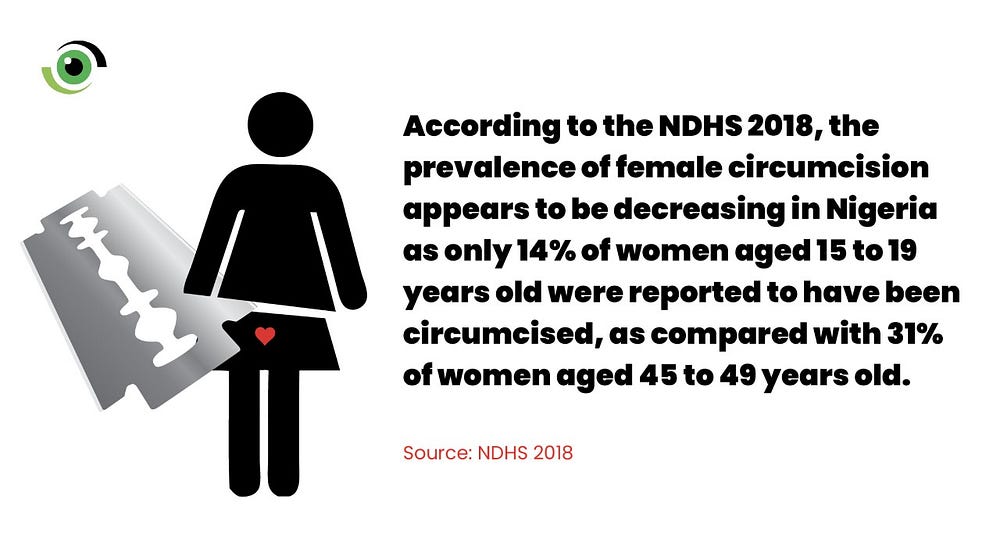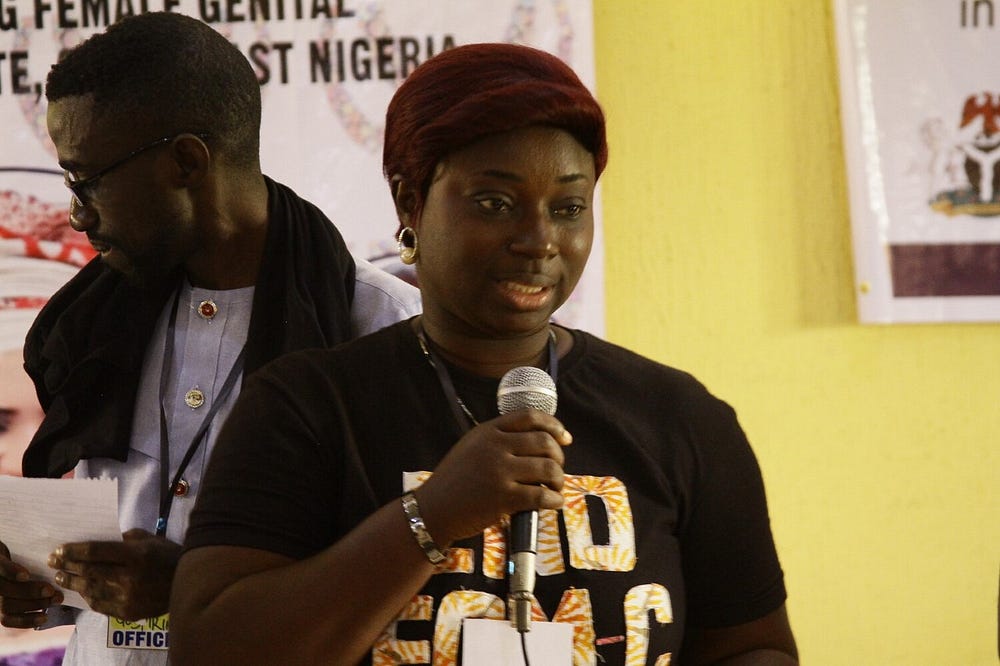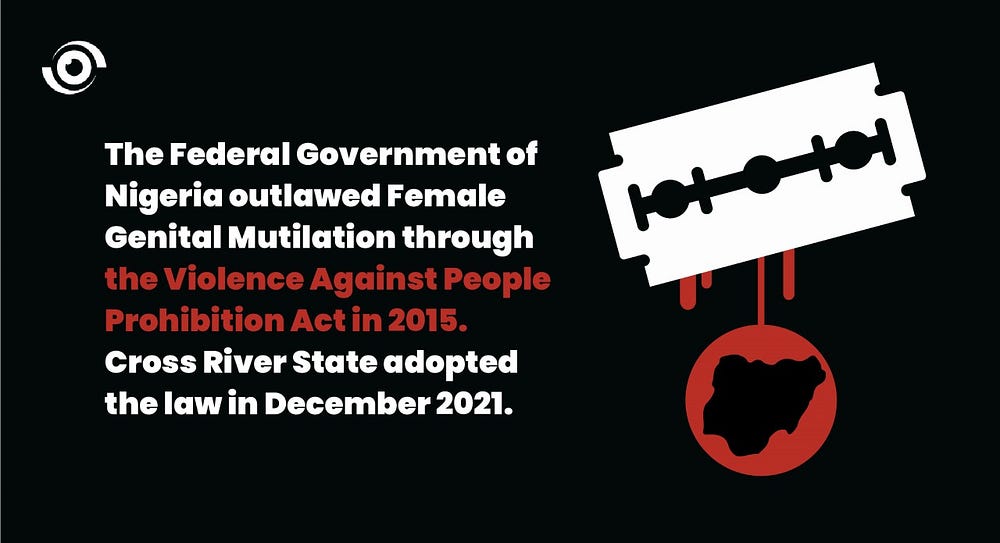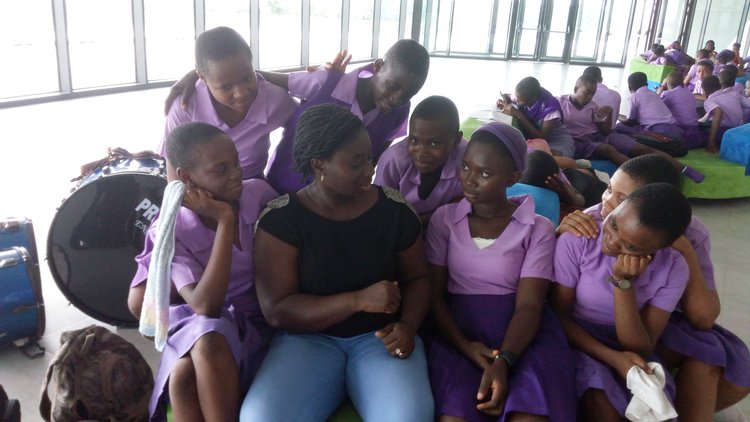By Violet Ikong (Lead Writer)
Female Genital Mutilation is a harmful cultural practice that violates the rights of girls and women. Although Nigeria’s Violence Against People Prohibition Act criminalises it, FGM is still common across the country. The Center for Social Value and Early Childhood Development (CESVED), a non-profit run by Gift and Augustine Abu is one of several organisations working to stop the practice.
Every four or five days, pregnant women in Agwagune, a community in Cross River State’s Biase Local Government Area visit the community’s primary health centre (PHC) to access antenatal services. The clinic sometimes runs at the same time as immunisation exercises for babies, and Mabel Inah, a health worker in the PHC uses this opportunity to discuss the risks associated with female genital mutilation (FGM) with pregnant women and nursing mothers. “I try to let them know that female circumcision is bad and that it is an old practice that was carried out by our grandfathers out of ignorance,” Inah said.
This remote community was known for practising FGM — also known as female circumcision — a culture-rooted harmful practice involving the partial or total removal of the external female genitalia or other injury to female genital organs for non-medical reasons. At least 200 million girls and women in 31 countries have undergone FGM, 80% of whom are in Africa. With 25% of Nigerian women and girls aged between 15 and 49 having undergone some form of FGM, the country has the third highest FGM burden in Africa.
According to the Nigeria Demographic and Health Survey (NDHS) 2018, the prevalence of female circumcision appears to be decreasing in Nigeria as only 14% of women aged 15 to 19 years old were reported to have been circumcised, as compared with 31% of women aged 45 to 49 years old.

Creating awareness with anti-FGM campaigns
In different parts of Nigeria, particularly in communities known for actively practising FGM, several organisations are working to stop the tradition — the Value Female Network educates communities in Osun State and distributes “survival kits” to survivors of FGM and gender-based violence. Society for the Improvement of Rural People works to end FGM in Enugu and Ebonyi States by helping communities understand why the practice must end. In Agwagune and several other communities in Cross River State, a married couple, Gift and Augustine Abu, started an anti-FGM campaign in 2011, creating awareness about the harms of FGM and persuading community leaders and cutters to end the practice.
Before Gift and her husband, both natives of Agwagune, took their campaign to the community, nobody dared speak-up against female circumcision as that could attract a violent response from the community members who once believed that the practice must be preserved and handed down from generation to generation. However, now people like Inah are speaking up against it.
A common practice
The couple’s determination to fight FGM started when Gift, a trained nurse, noticed some FGM-related scars on women while working as a nurse in the family planning unit of a public hospital in Keffi, Nasarawa State. She also observed that circumcised women experienced severe complications during childbirth, sometimes leading to death. “It was like any female who came to the family planning unit had a scar, and I was able to find out that the scars had something to do with a tradition and a custom which every woman in the community had to go through,” she added.

Motivated by this discovery, Gift did some research into the prevalence of the practice and her findings drove her to action, “I found the story interesting, started talking about the practice, and started fighting female genital mutilation,” she said. Discussing her discoveries with her husband, Gift was surprised when he agreed to work with her. She then resigned from her nursing job and together, they founded the Center for Social Value and Early Childhood Development (CESVED), a non-profit, to fight harmful traditional practices.
Engaging with communities
The CESVED team visits communities, engaging with community and religious leaders, men, women and youth leaders, as well as the cutters themselves.
“We believe that female genital mutilation is all about what people believe, so we need to talk to them, get them on board, and let them suggest ideas and ways in which the practice can be stopped,”.
The organisation takes its awareness campaigns to churches, marketplaces, and schools in the communities they visit. They also use radio and television jingles which enables them to reinforce their message and reach more communities than they are physically and financially able to. The team has taken their anti-FGM campaign to Agwagune, Okoyong, Ugep, and Akamkpa communities in Cross River, the couple’s home state.
Gift believes that they were one of the first few people to speak up against FGM in Nigeria. According to her, back then, nobody wanted to talk about FGM, but through their awareness programmes, people now talk about it across communities. Eleven years after they launched their campaign, Gift and her team can point to the fact that, their efforts have prevented over 500 female circumcisions. Advocacy to the then Obol Lopon of Ugep, also the traditional ruler of Yakurr Local Government Area, resulted in him condemning the practice and asking members of his community to stop mutilating their daughters. Also, over 30 cutters in different communities have stopped practicing FGM. CESVED provides alternative sources of livelihood for cutters, by training them in bead making, basket weaving, jewellery making, and fishery.
For the love of tradition
Although the campaign has been successful, some communities refuse to completely give up the practice because a family could be denied privileges and leadership positions for refusing to allow their daughter to be circumcised. “To belong to the chief cabinet or have a key position in the community, you must give your daughter out for mutilation in most cases. If the girl is not mutilated, she is seen as wayward and will never marry in that community,” Gift said.
Others feel strongly about it because tradition must be preserved. “It is from our origin. When we give birth to a female child, she must be circumcised. The government said it is not good, but we are still doing it because it is our tradition. We believe it is best for us here. Our grandfathers who introduced it were not fools,” said Ayi Akiba, a youth leader from Okoyong community in Cross River’s Odukpani Local Government Area, where Gift and her team began an anti-FGM campaign in 2017.
Gift also recalled how their team was almost attacked by people opposing the campaign. “I remember when we went to talk about female genital mutilation in one of the communities years back, our cameraman was attacked, and it almost caused a serious fight. We were not allowed to video in the community”.
Government effort
The campaign has been supported by the government in terms of policy, in 2015, the Nigerian government outlawed FGM through the Violence Against People Prohibition Act, stipulating a four-year jail term, a N200,000 fine or both, for violators. Cross River State adopted the law in December 2021, but seven months later, there has been no known conviction.

Michael Charles from Agwagune said the practice continues as “a few of them still circumcise girls secretly, but if an outsider asks them, they will deny it because the government banned the practice years back and because there has been some awareness condemning the act in the community.”
But Gift, whose group is supported by several organisations, including UK-based Projects For All, Women of the Year, The Guardian [UK], and change.org, said her team will keep campaigning until FGM is eradicated in Nigeria.
‘I won’t disappoint him’
Sadly, Augustine Abu died in March 2022. “He was a wonderful person. If I wanted to go to any community, he would always go there first to make sure that the way was clear before I go. You know, as a woman campaigning alone without having someone stronger like a man to go with you is always challenging,” said Gift who is still in mourning.
But determined to preserve his legacy, she has vowed not to give up. “It’s not going to be easy now. I, however, know that the way he has equipped me has made me strong. I know that I won’t disappoint him, and instead of slacking, I will wax stronger and do more than I’ve been doing.”
Domesticating the VAPP Act
FGM is a violation of the human rights of girls and women and the VAPP Act provides a comprehensive framework to eliminate it as well as all other forms of gender-based violence. The Act has been passed and assented to in 29 states in Nigeria, including the Federal Capital Territory (FCT) but all states serious about eliminating all forms of gender-based violence must domesticate the Act.
Beyond just domesticating it, states must also be purposeful about ensuring that it is properly implemented while taking care to address factors like culture and traditional beliefs which are the main drivers of the practice.


